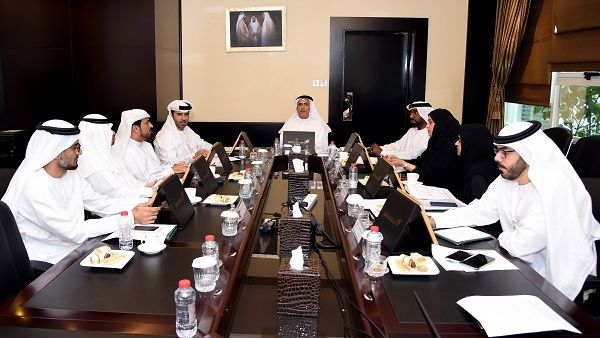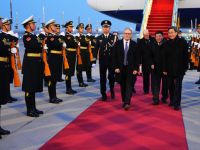Awqaf & Minors Affairs Foundation Adopts Endowments Investment Policy 2018-2021

The Board of Directors of the Awqaf and Minors Affairs Foundation (AMAF) has adopted a three-year Endowments Investment Policy (EIP) for 2018 -2021 to enhance capital and periodic revenues. AMAF will leverage EIP as a guideline to determine feasible economic sectors and to select assets and instruments for investment in accordance with the general policy.
The board meeting held at the AMAF headquarters was attended by senior board members including His Excellency Essa Abdullah Al Ghurair, Chairman, Abdul Rahman Hareb Al Hareb, Vice Chairman, His Excellency Ali Al Mutawa, Secretary General, and His Excellency Khaled Rashid Al Thani, Deputy Secretary General, as well as Ahmad Darwish Al Muhairi, Dr Abdul Aziz Mohammed Al Hammadi, Huda Essa Buhumaid, Hamda Ibrahim Mohammed Obaid, Abdulla Ali Al Madani, and Dr Hamad Al Hammadi, all board members of AMAF.
The Board of Directors reviewed the achievements of AMAF’s newly appointed Charity Work Committee, Investment Committee and Endowment Development Committee. In addition, it also reviewed the executive regulations of the Dubai Waqf Law No 14 of 2017 (the Dubai Waqf Law) and Dubai Law No 9 of 2007 Establishing Awqaf and Minors Affairs Foundation.
Innovative solutions for endowment investments
AMAF’s Investment Committee adopted EIP to ensure the protection of capital and the achievement of periodic returns from the Foundation’s local real estate and other investments. The committee has recommended leveraging innovative mechanisms to secure real estate financing through the development of vacant lands that will achieve returns of not less than 8 percent after the deduction of operating expenses, as well as other strategies such as ijarah. In addition, the investment policy has outlined guidelines pertaining to ownership transfer and charity takaful, and to the direct purchase of real estate with returns of 5 percent or more.
Regulatory standards for financial investments
Furthermore, EIP outlines criteria for the financial investments undertaken by the Investment Committee, whether in sukuk or deposits made via agencies or current yielding accounts. At the top of the criteria is the geographical scope of the financial investments within the country. As per the outlined criteria, sukuk, with a minimum yield of 4 percent as well as the eligibility for liquefaction and the resilience to commit to modern banking requirements, received a stable classification.
Following the approval of the AMAF Board of Directors, a periodic evaluation will now be undertaken of the performance of investments at the end of each quarter of the financial year, depending on the nature and type of investment and market value.
The Board has also outlined a clear and specific exit strategy mechanism through defining the periods of financial investments in a precise manner for sukuk, bonds, local listed stocks, non-local listed shares, unlisted stocks, direct investments, funds and portfolios. A percentage of the profits annually will be reserved to ensure the value of capital invested in securities portfolios, whether for minors or the endowment or the Foundation at large.
AED74 million for charity during Year of Zayed
For its part, the Charity Work Committee presented to the Board of Directors an overview of the clear methodology and mechanism applied in managing charitable projects. It also reviewed financial support policies and disbursement of social benefits that are aligned with fourth-generation standards of government excellence. The committee further presented the financial budget for charitable work in 2018, which has exceeded AED74 million to date. The amount was distributed across key sectors including education, charity, zakat, Islamic affairs and social affairs within 33 projects and targeted initiatives such as Shifaa, Kimam Wa Himam, Fonon Waqfia, Umrat Zayed and Hayatak Amanah.
Cooperation for righteousness
The committee also highlighted the joint philanthropic projects supported during the Year of Zayed. These included the voucher initiative for needy families worth AED700,000, in cooperation with Aswaq, the supermarket and mall operator owned by Investment Corporation of Dubai (ICD), the AED150,000 Umrah initiative, in cooperation with the Ministry of the Interior, and the AED450,000 Fund for Cancer Patients in collaboration with Dubai Health Authority (DHA). In addition, AMAF collaborated with the Community Development Authority on the AED1 million Social Solidarity Fund and the Faraj Fund that mobilized AED526,000 to pay off the debts of debtors. AMAF also joined hands with Emirates Charity to raise AED500,000 to support cancer patients, and the project of ‘Modon Al Khair’ to contribute AED500,000 towards the construction of homes for low-income people.
Attract health and education waqfs
The Endowment Development Committee also reviewed mechanisms and policies currently in place for the development of waqfs and to stimulate investment in them through activating marketing plans and programs, especially in the areas of health and education in Dubai in a bid to target a larger segment of beneficiaries.
Promote content for waqf development
The committee discussed ways to enhance communication with the community through improving the Foundation’s website and expanding AMAF’s presence on social media platforms in order to drive home its message and clarify its societal role. Through stepping up its online outreach, AMAF can also establish a sophisticated and detailed database to help sustain donations and contributions and ensure direct and continuous communication with donors. Online platforms will also facilitate donors to directly support or interact with various initiatives that AMAF periodically launches or participates in.
Speaking on EIP and the enhanced policy guidelines approved by the Board, His Excellency Ali Al Mutawa, Secretary General of AMAF, said: “The application of clear and transparent criteria that leverage the various innovative finance and Islamic economy solutions - with Dubai as its center – can provide a strong incentive for donors to participate in the care of minors. Equally, such guidelines encourage community participation in the development of waqf, and enable the benefits of takaful and charitable investments to reach larger social segments and broader development sectors, including education and health. Furthermore, they also ensure that endowments integrate innovation and new concepts where possible.”
He added: “The sustained development of performance and operational efficiency in all departments is in line with the Foundation's commitment to prioritizing its institutional and community mandate. Doing so deepens AMAF’s communication with the public and the beneficiaries of the services. We will continue to periodically announce new initiatives and highlight their results, thereby strengthening cooperation with our partners and stakeholders in the implementation of charitable and humanitarian projects.”
Background Information
Awqaf and Minors Affairs
The birth of the Awqaf and Minors Affairs Foundation (AMAF) came with the issue of law No. 6 in 2004 during the era of the late His Highness Sheikh Maktoum bin Rashid Al Maktoum. With the expansion of the institution in its work and functions, His Highness Sheikh Mohammed bin Rashid Al Maktoum, Vice-President and Prime Minister and Ruler Dubai issued law No. 9 in 2007 organizing the work of the institution, to ensure the provision of a conducive environment for greater achievements in the development of ‘awqaf’ and minors’ funds, and the care of their affairs, according to a well-aimed plan, and a conscious vision and insight.






